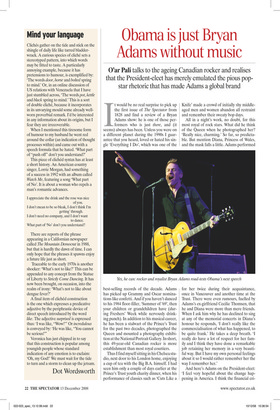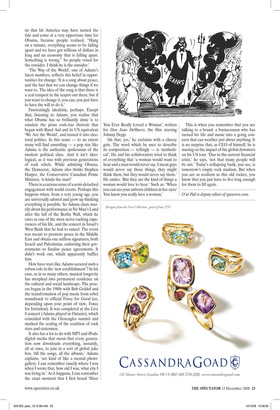Obama is just Bryan Adams without music
O’ar Pali talks to the ageing Canadian rocker and realises that the President-elect has merely emulated the pious popstar rhetoric that has made Adams a global brand It would be no real surprise to pick up the first issue of The Spectator from 1828 and find a review of a Bryan Adams show: he is one of those performers who is just there, and (it seems) always has been. Unless you were on a different planet during the 1990s I guarantee that you heard, loved or hated his single ‘Everything I Do’, which was one of the best-selling records of the decade. Adams has picked up Grammy and Oscar nominations like confetti. And if you haven’t danced to his 1984 floor-filler, ‘Summer of ’69’, then your children or grandchildren have (during Freshers’ Week while nervously drinking punch). In addition to his musical career, he has been a stalwart of the Prince’s Trust for the past two decades, photographed the Queen and mounted a photography exhibition at the National Portrait Gallery. In short, this 49-year-old Canadian rocker is more establishment than most royal courtiers.
Thus I find myself sitting in his Chelsea studio, next door to his London home, enjoying a cup of tea with the Big B.A. himself. I had seen him only a couple of days earlier at the Prince’s Trust youth charity dinner, when his performance of classics such as ‘Cuts Like a Knife’ made a crowd of initially shy middleaged men and women abandon all restraint and remember their sweaty bop days.
All in a night’s work, no doubt, for this most royal of rock stars. What did he think of the Queen when he photographed her? ‘Really nice, charming.’ So far, so predictable. But mention Diana, Princess of Wales, and the mask falls a little. Adams performed for her twice during their acquaintance, once in Vancouver and another time at the Trust. There were even rumours, fuelled by Adams’s ex-girlfriend Cecilie Thomsen, that he and Diana were more than mere friends. When I ask him why he has declined to sing at any of the memorial concerts in Diana’s honour he responds, ‘I don’t really like the commercialisation of what has happened, to be quite frank.’ He takes a deep breath. ‘I really do have a lot of respect for her family and I think they have done a remarkable job retaining her memory in a very beautiful way. But I have my own personal feelings about it so I would rather remember her the way I remember her.’ And here’s Adams on the President-elect: ‘I feel very hopeful about the change happening in America. I think the financial cri sis that hit America may have turned the tide and come at a very opportune time for Obama, because people realised, “Hang on a minute, everything seems to be falling apart and we have got trillions of dollars in Iraq and an economy that is falling apart. Something is wrong.” So people voted for the outsider. I think he is the outsider.’ ‘The Way of the World’, one of Adams’s latest numbers, reflects this belief in opportunities for change. ‘It is a song about peace, and the fact that we can change things if we want to. The idea of the song is that there is a real tempest in the teapot out there, but if you want to change it, you can, you just have to have the will to do it.’ Frustratingly idealistic, perhaps. Except that, listening to Adams, you realise that what Obama has so brilliantly done is to emulate the pious rock-star rhetoric that began with Band Aid and its US equivalent ‘We Are the World’, and turned it into electoral politics. In this sense — to an extent many will find unsettling — a pop star like Adams is the authentic spokesman of the modern political class. And it isn’t ideological, as it was with previous generations of rock rebels. While admiring Obama, the Democrat, Adams also thinks Stephen Harper, the Conservative Canadian Prime Minister, ‘is kinda the man!’ There is a curious sense of a semi-detached engagement with world events. Perhaps this happens when, from a very young age, you are universally adored and grow up thinking everything is possible. So Adams chats merrily about his performance in No Man’s Land after the fall of the Berlin Wall, which he rates as one of the most nerve-racking experiences of his life, and the concert in Israel’s West Bank that he had to cancel. The event was meant to promote peace in the Middle East and obtain one million signatures, both Israeli and Palestinian, endorsing their governments to finalise peace agreements. It didn’t work out, which apparently baffles him.
How have stars like Adams secured such a robust role in the ‘new establishment’? In his case, as in so many others, musical longevity has morphed into permanent residence on the cultural and social landscape. The process began in the 1980s with Bob Geldof and the transformation of pop music from rebel soundtrack to official Force for Good (or, depending upon your point of view, Force for Irritation). It was completed at the Live 8 concert (Adams played in Ontario), which coincided with the Gleneagles summit and marked the sealing of the coalition of rock stars and statesmen.
It also has a lot to do with MP3 and iPods: digital media that mean that every generation now downloads everything, instantly, all at once, to join in a sort of global juke box. ‘All the songs, all the albums,’ Adams explains, ‘are kind of like a mental photogallery. I can remember exactly where I was when I wrote that, how old I was, what city I was living in.’ As it happens, I can remember the exact moment that I first heard ‘Have You Ever Really Loved a Woman’, written for Don Juan DeMarco, the film starring Johnny Depp.
‘Ah that, yes,’ he exclaims with a cheesy grin. The word which he uses to describe its composition — tellingly — is ‘methodical’. He and his collaborators tried to think of everything that ‘a woman would want to hear and a man would never say. I mean guys would never say those things, they might think them, but they would never say them.’ He smiles. ‘But they are the kind of things a woman would love to hear.’ Such as: ‘When you can see your unborn children in her eyes/
Spct ds2Css Gd31/10/08 12
You know you really love a woman.’ This is when you remember that you are talking to a brand: a businessman who has turned his life and music into a going concern that can weather just about anything. It is no surprise that, as CEO of himself, he is musing on the impact of the global downturn on his US tour. ‘Due to the current financial crisis,’ he says, ‘not that many people will be out.’ Today’s collapsing bank, you see, is tomorrow’s empty rock stadium. But when you are as resilient as this old rocker, you know that you just have to live long enough for them to fill again.











































































 Previous page
Previous page